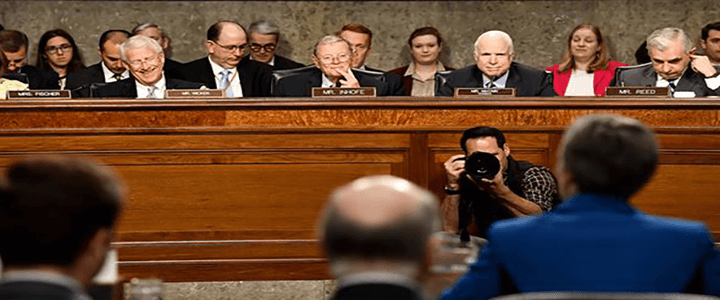The Senate Armed Services Committee got back to work on the backlog of nominees for top defense posts yesterday. Committee chairman Sen. John McCain presided over the nomination hearings for four individuals who have been waiting more than three months to appear, including Dr. Mark T. Esper, the president’s nominee for secretary of the Army.
The SASC had been averaging 28 days between nomination and hearings, before taking an average of103 days to get to yesterday’s hearing. McCain addressed this delay in the hearing. “The reason these nominations have not been acted on as rapidly as possible is because failures of communication between this committee and the Pentagon,” he said, “which is a shame, since I have known them for many, many years.” He did not elaborate, however, on what that communications breakdown might be.
But even with the most recent rounds of nominations, 15 Senate-confirmed positions of the 54 total which require it still do not have nominees, 10 months into the president’s term.
Esper gets support, with reservations
Daily Intel first examined the Esper nomination shortly after the president announced it in August. At the time, I warned that Esper’s nomination would be controversial. Although he graduated from West Point, served for a decade on active duty, including in Operation Desert Storm, and retired from the Virginia National Guard as a colonel in 2007, he is best known in Washington as a defense lobbyist.
As I wrote then, Esper began his lobbying career with the Aerospace Industries Association, which represents aircraft manufacturers, and later ran the U.S. Chamber of Commerce’s Global Intellectual Property Center. But for the last seven years, he has been Raytheon‘s Vice President of Government Relations. As such, he was the chief lobbyist for the company that makes a wide variety of missiles and radars for the DoD and for export.
Sen. McCain has made no secret that he thinks the Trump administration is relying too heavily on defense industry executives for these high-level positions. “I would be remiss if I did not reiterate my concerns about the number of nominees from defense industry filling out the leadership ranks at the Department of Defense,” he said yesterday. Beyond the current list of nominees, he said he would not support anymore executives for Senate-confirmed positions in the department.
Draining the swamp is tougher than it sounds
But this leaves the administration in a tough position. There are five main pools from which to draw the people with the knowledge of how to run the DoD: retired officers, defense executives, congressional staffers, former defense officials, and academics. The president, and many of his supporters, have a fundamental issue with appointing professors who write a lot but have never had to manage anything. The president’s opponents have made no secret of the fact that they think he’s already appointed too many former generals to civilian positions. And those who have previously served in the Pentagon who are also acceptable to the president have been out of the building for more than eight years.
During that exile, many found work in industry. That would leave Congressional staffers, who are, for the most part, “swamp creatures” themselves.
Everyone is slowly realizing that draining the swamp means getting rid of everyone who knows how to actually get things done. It is said that for every great tactician there is a logistician who rides on his back and whispers “you can’t do that.” The same is true for political appointees who have no prior experience with the offices they are selected lead.
The swamp is filled with alligators. And alligators pack a mean bite. I have watched several political appointees begin their tenure with grand plans, only to discover to their great frustration that there is a mountain of laws and regulations between them and their goals.
The work the DoD does is far too important to let a career in the defense industry be a bar to serving the nation.




